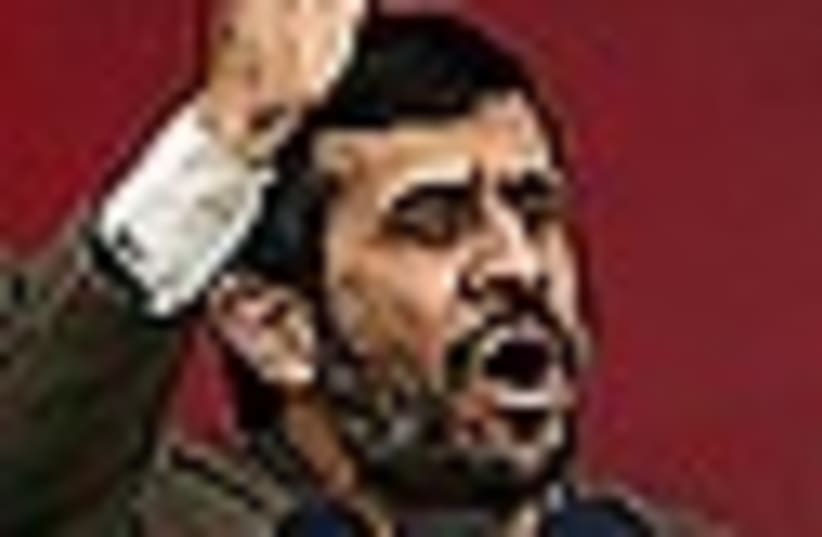Analysis: Iran's stake in the success of Hamas's 'resistance'
Hamas' performance gives little cause for celebration in Iranian-led camp.
Over the weekend, Saeed Jalili, Secretary of Iran's Supreme National Security Council, met with Syrian President Bashar Assad, and with Hamas leader Khaled Mashal, for consultations on the Gaza situation. Meanwhile, Hizballah leader Hassan Nasrallah delivered his latest bloodcurdling speech on Wednesday.
He promised that the war of 2006 would be a 'walk in the park' compared with what Israel could expect if it attacked Lebanon. Influential Iranian Parliamentary Speaker and former nuclear negotiator Ali Larijani, too, tried his hand at raising the rhetorical stakes - claiming that Israeli forces had suffered a 'great blow' as a result of the actions of the 'zealous Palestinians.'
These developments illustrate once more the extent to which the current contest between Hamas and Israel in Gaza is a battle in a larger war, rather than a self-contained conflict. The Katyusha fire in the north is the first indication that Hamas's friends may be considering intervention to help their ally in its predicament. The performance of Hamas in the conflict so far gives little cause for celebration in the Iranian-led camp.
There has been much speculation regarding possible Iranian involvement in Hamas's decision to reject a renewed ceasefire in December, and thus make conflict inevitable.
What may be said with certainty is that Iran knew in advance of the decision by Khaled Mashal to reject renewed terms for a ceasefire. Teheran thus evidently considered that its protégés were ready to bear the likely consequences.
Iranian military aid to Hamas has been steady and vital to Hamas since its coup of July, 2007. The movement has been equipped with dozens of Iranian Fajr-3 missiles - the longest range ordnance it is currently thought to possess. The 122mm Grad rockets with which it has been firing at Israeli towns in the last days are in its possession because of the Iranian connection.
Reva Bhalla, an analyst at the private intelligence firm Stratfor, recently described the role played by Hizballah operatives in transferring weaponry into Gaza. She noted arms purchases in Sudan, and the involvement of Hizballah men in transferring weaponry through Egypt, bribing officials and employing the services of Beduin smugglers along the way.
So the status of the Hamas enclave as a fully paid up member of the Iran-led regional alliance is not in doubt. The Palestinian issue is a matter of central interest to the masses of the Arab world. Iran, if it wishes to achieve the regional hegemony it desires, needs to convince Sunni Arabs that non-Sunni, non-Arab Iran is nevertheless a worthy regional leader.
The attempt to create an alternative, militant, Iran-sponsored, Islamist version of the Palestinian national movement is a central part of this strategy. Thus, the existence of an Islamist-controlled, functioning, fighting entity, in the heart of 'Palestine', bordering the arch rival of Egypt, and engaged in direct conflict with Israel is of central importance to the Iranian regional strategy.
This entity has so far failed to prove itself in the current contest. The 'Muqawamma' (resistance) doctrine promoted by Iran considers that Israel, despite its technological advantages, will be cowed by the greater determination and will to sacrifice of the Islamist fighters it faces. But the fighting in Gaza so far does not appear to have followed this pattern.
Rather, Israel has succeeded in destroying Hamas's command and control system, and has taken a heavy toll of the movement's operatives, at relatively low cost to itself. Iranian sources suggest that Tehran has been surprised by the meticulousness of Israel's planning, and by the direction of events so far.
Concern exists of possible action by Iran's northern proxy, Hizballah, in support of Hamas. A Hizballah move of this kind was the opening act of the 2006 war. Hizballah also carried out action on the northern border following the outbreak of Israeli-Palestinian fighting in 2000. The Katyusha fire in the north almost undoubtedly took place with the knowledge of Hizballah. They are a response to Hamas's distress, from their northern ally. But since the missiles were fired by a Palestinian organization, they do not yet make war on a 'second front' inevitable. Israel may be content with a limited response.
Certainly, a decision for war at the present time is enormously problematic for Hizballah. The movement made significant political advances in the course of 2008. Its coalition is expected to win upcoming elections in June. At the same time, there is a great war-weariness among the Lebanese population in general, and the Shia of the south in particular. The destruction that would be wrought by a new war would run contrary to Hizballah's current slow accumulation of political power in Lebanon.
If something resembling the Egyptian truce proposal (with improved measures to prevent smuggling) ends up being implemented, and if Hamas fail to improve on their current poor military showing, then the current round of fighting in Gaza is likely to be remembered as constituting a limited setback for the Iranian interest in the region. Of course, no truce is yet in sight, and a further round of fighting in built-up areas may still lie ahead.
if(catID != 151){
var cont = `Take Israel home with the new
Jerusalem Post Store
Shop now >>
`;
document.getElementById("linkPremium").innerHTML = cont;
var divWithLink = document.getElementById("premium-link");
if(divWithLink !== null && divWithLink !== 'undefined')
{
divWithLink.style.border = "solid 1px #cb0f3e";
divWithLink.style.textAlign = "center";
divWithLink.style.marginBottom = "40px";
divWithLink.style.marginTop = "40px";
divWithLink.style.width = "728px";
divWithLink.style.backgroundColor = "#3c4860";
divWithLink.style.color = "#ffffff";
}
}
(function (v, i){
});

